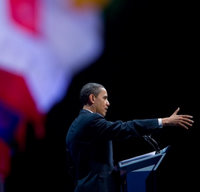Addressing the possibility that the U.S. and Europe will shy away from military interventions post-Iraq/post-Afghanistan, Richard Gowan suggests that emerging countries — Brazil, China and India, in particular — could very well step in to fill the gap in the context of U.N. state-building operations. It tracks well with what Matt Armstrong wrote in his WPR feature article, U.N. Peacekeeping as Public Diplomacy. (Gowan’s article in that issue, The Tragedy of 21st Century U.N. Peacekeeping, makes for good reading, too, as a cautionary note.) In this case, emerging countries’ interest in burnishing their global bona fides would overlap with U.S. […]
The Americas Archive
Free Newsletter

I am happy to report that, despite my fears, no dead fish arrived on my desk as a result of my last WPR column, in which I suggested that the best way for President Barack Obama to secure his fragile foreign policy gains would be to announce that he would not run for re-election. But while many readers found the piece to be an interesting intellectual exercise, the near-unanimous reaction was that this scenario would never occur in the real world. My concern was that the growing preoccupation first with the midterm elections, then with a re-election campaign in 2012, […]

The Washington Post’s recent series, “Top Secret America,” depicts significant organizational challenges in the intelligence community. Many of its observations have merit, but organizational dysfunction is not confined to the intelligence system. The Post’s description of the sprawling, uncoordinated intelligence bureaucracy mirrors the shortcomings of the overarching national security system, which has repeatedly demonstrated that it is not capable of handling today’s threats and opportunities. The blame for this antiquated system does not solely belong to the Bush or Obama administrations; systemic problems date back to the design of the national security apparatus in 1947. In recent decades, an increasingly […]
